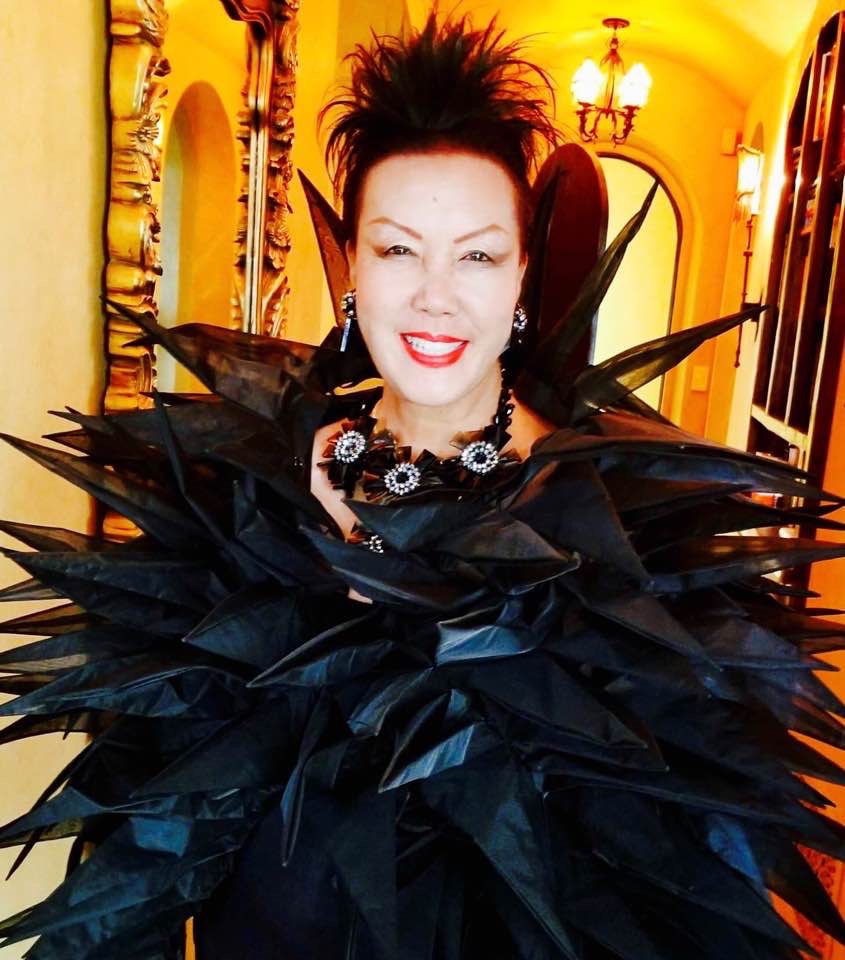When renown fashion designer Sue Wong undertook the restoration of her beloved The Cedars, the breathtaking palazzo she calls home, no detail nor expense was spared nor overlooked in reinstituting its past grandeur. The Cedars was once the fabled Grande Dame, the epitome of Old Hollywood glamour and reputedly the most opulent home of its day when she was conceived in the Golden Age of the 1920s.
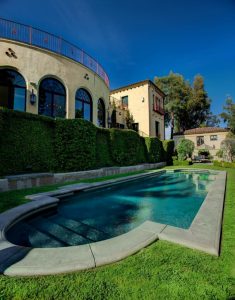
The property came by its name in celebration of the forest of cedar trees that once populated the Los Feliz hill upon which it is imperiously perched, commanding a dramatic 360 degree city to ocean view of Los Angeles. Upon crossing its historical threshold, one is instantly transported through a portal of time into a hallowed temple of Hollywood history. Its mesmerizing mystique, beauty and allure is immediately palpable—it stands as a gloriously preserved palace that is the embodiment of grandeur—a relic of Golden Hollywood from another era. The dizzying kaleidoscopic opulence and the complex period details is an artistic sensory overload that immediately staggers and arrests the imagination. One can instantly feel the undeniable magic and collective energy of the illustrious immortals who once occupied this famed and fabled palace. Their stories will remain embedded and written within the walls of The Cedars, forever becoming a part of its halcyon history.
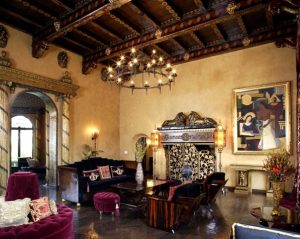
Since its conception, The Cedars has subsequently served as host for a constellation of legendary Hollywood stars and musical royalty including Norma Talmadge, Joseph Schneck, founder of 20th Century Fox Studios, Béla Lugosi, Errol Flynn, Howard Hughes, Marilyn Monroe, Jimi Hendrix, Lou Reed and the Velvet Underground, Andy Warhol, Dennis Hopper, Bob Dylan, Jim Morrison, John Phillips, Brian Jones and The Rolling Stones, as well as Johnny Depp. It has also been featured in a number of Hollywood film classics, including Sunset Boulevard (1949) and Easy Rider (1969).
The Cedars was a famed Rock palace in the 1960s and has hosted many former rock legends as former residents. The idiomatic expression “If These Walls Could Talk” is not merely an expression but a living ritual that unfolds time and again at The Cedars when today’s musicians from all corners of the world celebrating music in all genres, grace its living spaces. Each and every one of us has our own energy that we emanate. There are metaphysical studies that examine how walls are equivalents of sponges having the ability to “house” the sound and soul of the music once played within given confines. It is said that Jimi Hendrix composed the iconic “Purple Haze” while residing at The Cedars. There must undoubtedly be something very powerfully true about these walls being ears and magnets, bearing testimony to the incredible vortex of creativity and artistry which unfolded within The Cedars ever since it was conceptualized and built by silent-screen MGM French film director Maurice Tourneur in the years between 1921 and 1926.
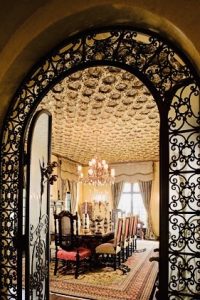
In 1921 the visionary French artist and director Maurice Tourneur, while living and working for MGM Studios in Hollywood masterminded the plan for this magnificent and majestic estate, inspired by the Duke of Alba’s villa in Spain. Tourneur’s vision was to feature terraced gardens, lakes, and fountains on an expansive 15 acres to surround the grand palazzo. He had hoped to live in the house but sadly never did; he returned to France before the mansion was completed because of an impending divorce.
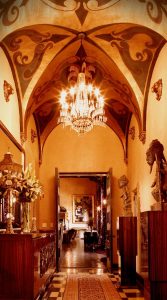
By then, in the mid 1920’s, he had developed disillusionment with the direction he thought the American film industry was taking, toward becoming a business and not the art form through which he desired to give creative expression as an artist. As his last testament and creative contribution to Hollywood, Tourneur crafted an enduring monument, an inspired work of art that uniquely became The Cedars. Furthermore, his creative spirit still permeates the house and is faithfully kept alive by the current mistress of the house, designer Sue Wong. The Cedars is no ordinary home; it was created as a visionary work of art by Tourneur. He collaborated with set designers at MGM studios, and imported French, Italian and German artisans to create the ornate gilded bas relief ceilings, decoupage, the many hand-painted frescoes and classical colonnade of the palazzo. The impact of this chateau cannot be underestimated: the original resident of The Cedars, silent movie star Madge Bellamy, recalled upon first seeing the estate that she was too awed to speak of the nearly half block long grand mansion. Upon first entering the house she later stated that her legs literally shook.
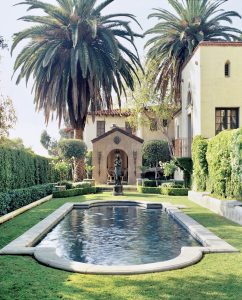
In 2004, designer Sue Wong rediscovered the majestic architectural monument of The Cedars, then mired in disrepair and obscurity. She fell in love immediately with the faded glamour and opulent details of the estate. The designer, known for her glamorous vintage inspired gowns featuring elaborately detailed couture elements, such as beadwork, appliqué, embroidery and hand painting, had an immediate and natural affinity for the soaring bas relief ceilings, gilded columns, period ironwork, and frescoed archways of The Cedars, whose ornate details, grand style, and vintage provenance reflect her own romantic design sensibilities.
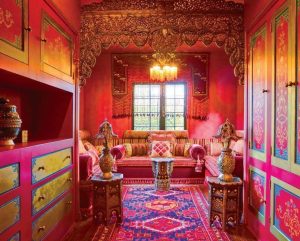
Sue Wong took on her role as a steward seriously and she committed her passion tirelessly for three years to both restore and embellish upon its grandeur to save The Cedars from a fate of certain decrepitude. She created a work of art within a work of art through her interior design which honored the original architecture and intricate details of the home created by Tourneur. Wong meticulously restored the estate to its former grandeur and glory, while maintaining its patina of antiquity. She began the process by commissioning a team of European artisans lead by Zoltan Papp to restore each of the ceilings, archways, fireplaces, sculptural elements and columns in an intensive two year process that removed over 83 years of grime and dirt that had obscured much of the artwork. Sue Wong then scoured the globe for antiques, from France, Spain, Italy, Morocco and England to create a unique environment to suit each of the estate’s 26 rooms. The global search for antiques appropriate and suitable to the elegant and majestic architecture of the Cedars resulted in an artful assembly of many magnificent designs from such diverse design idioms as Baroque, Empire, French Art Deco, Moroccan and Andalusian styles. Her creative spirit and unique signature style is evident in every square inch of the premises, as she personally commissioned, selected, curated or designed every piece of decor, art and furnishing in the all rooms of The Cedars.
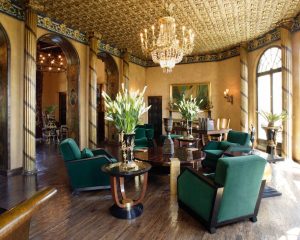
The designer also commissioned custom artwork and designed one of a kind upholstery patterns, pillows, and drapery to further enhance the rich detail of the home. The result is one of the most dramatic and extraordinary estates in Los Angeles and a stunning homage to the iconic glamour of early Twentieth Century Hollywood.
Sue Wong Official Websites
Instagram: https://www.instagram.com/suewongfashion/
Facebook: https://www.facebook.com/suewongpublicfigure
By Faith Boutin and Murray Rosen (FVM Global Magazine) with Sue Wong
